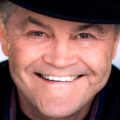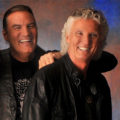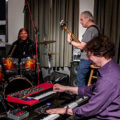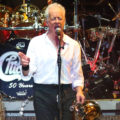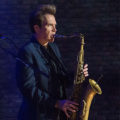Felix Cavaliere’s Rascals ready to get loose with lots of “Good Lovin’” for major benefit
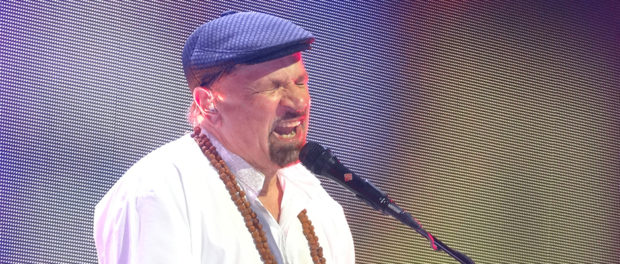 Photos provided by Moxie Publicity
Photos provided by Moxie Publicity
Whether with The Rascals or on his own, Felix Cavaliere remains the leader of the pack when it comes to mixing rock n’ roll with blue-eyed soul for more than 50 years. And thanks to an arsenal of unforgettable songs such as “Groovin’,” “People Got To Be Free,” “A Beautiful Morning,” “How Can I Be Sure?” and “Good Lovin,’” the legend will live on long after he’s gone, though even at 75-years-old, the Rock and Roll Hall of Famer is a dependable regular on the road. For Midwestern audiences, that specifically means a very special show starring Felix Cavaliere’s Rascals and R&B veterans The Spaniels Forever to benefit Hospice of the Calumet Area at the Memorial Opera House in Valparaiso, IN on Saturday, June 9. Chicago Concert Reviews scored all the details straight from the mouth of the man with the golden voice, along with some bonus subjects stretching from the 1960s to The Rascals’ unexpected reunion but perhaps just as unlikely complete return.
How did you get connected with the Hospice of the Calumet Area benefit concert?
Felix Cavaliere: A friend of mine, actually I met him as a fan, Damian Rico kind of set this thing up for us. He contacted me and wanted to know if I’d be interested in playing for this event and I said “yes of course.” This is a very interesting thing for me. It’s a combination of hospice and music therapy. Both things have played important roles in my life and many other people’s lives, especially the hospice part of it. I don’t think there’s too many of us who haven’t had parents or loved ones or friends that needed care like that, so it’s important. The music therapy part, I won’t say it’s experimental, but it just hasn’t hit the mainstream, has also been really interesting to me. I started out in pre-med and come from a family of medical folks. It’s just interesting to be around it.
Music is such a source of healing, motivation and positivity, plus I’m sure you’ve heard many reactions from fans as to how your music’s played a role in each of those aspects.
Cavaliere: You know I really have. I’ve had a lot of people who have approached me with different stories of how my music has entered their lives in interesting ways that had very, very positive, healing, buoyant and inspirational messages. That really has always been fascinating to me because most people when they start in rock n’ roll, those implications are not really what they’re thinking (laughs). But as you get a little older and meet with people who’ve been affected by it, it is really fascinating.
 What’s on tap for the show itself?
What’s on tap for the show itself?
Cavaliere: Our generation did not have the iPhone, Facebook, Instagram and Internet situation that these people have today. We had our music to bind us together. That was our cementing factor and kind of our newspaper to the inner feelings of a lot of the people that were in our generation- the Lennon/McCartney’s, The Lovin’ Spoonful and all of us. We communicated that way, so that’s what I try to do in a live concert. I try to bring that feeling of community to the music. People usually sing, dance, enjoy themselves and re-ignite some of their memory banks to what was going on in those days. I try to create that atmosphere.
Are there any specials components of Felix Cavaliere’s Rascals that might not come with other incarnations of the group?
Cavaliere: Well, especially with that “Once Upon A Dream” [reunion that started in 2013] we were fixed to a script and [now] I have a lot more freedom. I can jump around and do a lot of different things that I couldn’t do with a big screen behind me like that. I have a band of guys that come from Nashville, Tennessee primarily that love to play music. We just have a good time and it’s loose. It’s much looser, kind of like the difference between playing jazz and a classical piece. The classical piece being very strict that you cannot elaborate or change and jazz being purely creative. I really enjoy the creative part of it.
Can you flashback and give us a slice of that early 1960s scene when you started?
Cavaliere: I was a college student and I was asked to work in the Catskill Mountains where I was seen by a group called Joey Dee and The Starlighters, who not even a month or two later found themselves in Europe in need of an organ player and they called me and flew me over to Germany. The next thing I know, we’re on the stage with The Beatles, and The Beatles at that time were not known in America. I saw something that was to be my career and I realized I could do what these guys were doing, with all due respect. I said “let me go back to the States and start a band.”
It was a lot of fun. The females in the audience were going absolutely berserk, I said “this is something I think I could enjoy.” It was quite an experience. Of course the rest of the US became aware of The Beatles shortly after that when they came to do “The Ed Sullivan Show.” That really was the beginning and it was a lot different than what it is now. Now it’s evolved into a humongous business, which like all business, has fallen by the wayside into “the most money wins.” But in those days it was not like that. It was a little bit of a strange field that you had to be a little nuts to be in. It wasn’t the millions of dollars that are now available. You did it for the love of music and for whatever other reasons you had, and if you were good, you usually had a chance to make it, whereas today, it’s a whole different thing. Unfortunately, capitalism has entered the situation to such a degree that if you don’t have backing, you better be exceptional, otherwise you’re just gonna fall by the wayside. I try not to discourage young people, but for the most part, it’s difficult, very difficult.
 Do you have any idea as to the secret recipe that kept your hits coming and enduring to the point where we’re still singing them today?
Do you have any idea as to the secret recipe that kept your hits coming and enduring to the point where we’re still singing them today?
Cavaliere: We were the first white act on the Atlantic Records label. The environment that they provided for us to work and the people that they surrounded us to work with was just magic. The land was so fertile and it was just perfect. All you had to do was drop a little seed in there and it grew to be a magnificent plant. It was amazing there and the talented people that were in that building, not only musicians, but people in the engineering world and producing world, they were geniuses! Seriously, I’m speaking of Arif Mardin and Tom Dowd and the Ertegun family, who came from Turkey. I mean it’s just a great story. To me, if you can’t make great music in that environment, you can’t make good music.
Do you have any particular favorites from your extensive catalogue?
Cavaliere: The audience starts smiling and singing when we do a song like “A Beautiful Morning.” Of course that makes you feel great. “How Can I be Sure?” always gets a standing ovation. It’s just amazing because you get that feedback instantly, which is what is nice about playing live. You get an instant reaction that kind of makes you a little bit bias as to what songs you like better. You like what they like.
What about “Good Lovin’”? That has adapted several lives of its own in movies and pop culture in general.
Cavaliere: In the old days, you were not allowed to play original songs. You had to play what they call “cover records” because the audiences that we played to in those days were 21 and over. So I had to go and find songs that were interesting for us to play that we could prove were cover records. Well I found a record by this group called The Olympics done a whole different way, like a Latin cha-cha. The moment I put that into our set, people just jumped up and started dancing and it’s endured all these years. You can’t predict anything like that, you can just kind of say “okay, that’s fine with me.”
Can you walk us back through Rock and Roll Hall of Fame induction night in 1997, which also included The Jackson 5, The Bee Gees, Parliament Funkadelic and Crosby, Still & Nash, along with the many emotions that came from finally getting honored?
Cavaliere: The last time I saw a lot of these people was that night. That’s really what sticks in my mind the most. A lot of them are gone, The Bee Gees especially. Those guys were in the same family, the same label and shared the same producer for a while. As far as the actual event, it was a little difficult because the group was estranged at that time. The emotions were a little high and there were feelings. It happens to a lot [of bands]. If you see some of the induction ceremonies, guys don’t even show up. It was really mixed.
 And as far as the time period, well, you know, the way the Hall of Fame works is kind of interesting. All of us who are in it vote, but we don’t nominate. The nominations are the tricky part and I can only say we had tremendous amount of help from people who kind of put our name in front of the board. Some of them like, for example, Phil Spector was very, very involved in helping us out. Steven Van Zandt of course was very involved as was Frankie Valli and Dion. A lot of the people who were in there kept putting our name in and putting our name in.
And as far as the time period, well, you know, the way the Hall of Fame works is kind of interesting. All of us who are in it vote, but we don’t nominate. The nominations are the tricky part and I can only say we had tremendous amount of help from people who kind of put our name in front of the board. Some of them like, for example, Phil Spector was very, very involved in helping us out. Steven Van Zandt of course was very involved as was Frankie Valli and Dion. A lot of the people who were in there kept putting our name in and putting our name in.
Unfortunately, that carries a lot of political, how should I put it, bias or influence. I mean there’s no question about it. If you don’t get on the ballot, you can’t get in. Getting on the ballot was the difficult part, but getting in was not that difficult once you were on the ballot. I should probably just leave it at that cause it’s a little weird man and I get people all the time [talking about it], peers in the music business, like Chubby Checker. He’s not in and it really bothers him. I don’t know what it is. I get some funny stories like Eddie Money. Eddie’s a good friend and he calls me up (imitates voice) “Felix, you’ve gotta get me in the Hall of Fame. My kids think I’m a bum. Sometimes I wonder if I’m the Pete Rose of rock n’ roll. (laughs) I love him! That’s a great line.
Do you feel like the reunion would that have happened without Little Steven and his persistence to get you guys back?
Cavaliere: I mean that’s the right word because nobody would ever do what he did, I mean seriously. The beating that he took to put that thing together should be documented (laughs). One of the things that I’ll never understand- I’m writing a book about my life- and one of the things I don’t understand is why our band doesn’t want to get together and have a reunion. Because every musician that I see from the old days, you have to literally drag them off the stage, even Ringo [Starr from The Beatles], who certainly doesn’t need a dollar, but loves it. It’s always been something that really bothers me why the guys don’t want to go out, but he did it! A lot of things that were underlying factors that haven’t reached the public are totally unnecessary. But he’s just a persistent guy I’ve gotta say because nobody would do what he did to make that happen.
Are there any previews you can give us from the book?
Cavaliere: Basically what happened is when we did that tour, there would be a lot of press and a lot of interviews and what I noticed is everybody had a different story (laughs). I mean seriously, it was like we went to this sporting event and everyone was watching a different game. How about I write a book so that at least my story is documented? I mean they would ask “how did you guys get the name?” and there were four different stories! It really struck me as saying “wow, let’s get it written down and see who really won the battle of waterloo” (laughs). It’s true man!
What went right and wrong with “Once Upon A Dream”?
Cavaliere: What went right, and it’s interesting because when musicians get together, to me there’s a word called “magic.” It’s not necessarily the all-star team that wins. It’s the team that has that special something and that’s what came back after a short period of time when people got their sea legs back as far as playing together. That magic came back and I think a lot of people experienced that. I can’t explain it except it was there. And as far as the bad parts of it…the business part of it fell down. It’s unfortunate because it shouldn’t have. It should’ve been kind of shrunk to take on the road in a smaller capacity and it would’ve been fine. It was too big to carry around. Unless you’re U2 or Bruce Springsteen or Bon Jovi, those guys carry anything they want. But that’s where it felt apart, right there…
Is there anything else you’d like to add?
Cavaliere: Basically what I’ve been publicizing is the guitar player Gene Cornish and I are going out in Felix Cavaliere and Gene Cornish’s Rascals this summer. I tried to get the other guys to come along and it wasn’t successful, but he wants to come and we’re gonna go out and rock n’ roll. We’re going to bring along a special drummer, Carmine Appice from Vanilla Fudge and Cactus. Like I say, “if you don’t enjoy what you’re doing, you shouldn’t do it.” We really enjoy what we’re doing and we’re looking forward to it!
Felix Cavaliere’s Rascals perform at the Memorial Opera House in Valparaiso, IN on Saturday, June 9. For additional details, visit FelixCavaliereMusic.com and HospiceCalumet.org/Events/.

